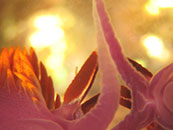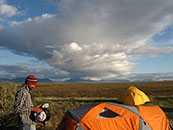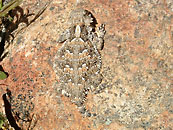- Overview
- The Masters program is central to the Ecology Program's mission of excellence in research and education in ecology and environmental biology. Graduate students contribute and design research that advances the science of Ecology and provides answers to real world questions. The integration of basic and applied research also provides students with experience valuable for a diversity of future employment opportunities. The program emphasizes quantitative approaches and the framing of problems within the context of ecological theory.
- Degree Requirements
Students must complete 30 units of upper division and graduate courses with a minimum 15 graduate units selected from the biological sciences or from closely related fields such as geography, geology, and mathematics. See the Graduate Course Catalog (504K PDF) for more information.
Each student is responsible for completing an original research project and written thesis, along with a final defense of the thesis and its implications in the broad fields of ecology. Graduate students should strive to publish their thesis research in peer-reviewed journals in ecology or related fields.
- Admission
- Successful applicants to our program typically have:
- Strong letters of recommendation from people who have observed the applicant in a research setting outside of the classroom and can comment on their ability to excel in graduate school.
- A well-written Personal Statement of Research Interests. Ideally, these should link what you've accomplished to what you hope to do in graduate school.
- A Bachelor's degree in Biology or a related field (e.g. Environmental Science, Ecology, Marine Science). Applicants with a Bachelor's in a different field often are not as competitive, in part because of their lack of experience conducting relevant research. Additionally, if accepted, such students may be required to take additional coursework.
- For foreign students, a minimum score on the TOEFL exam of 550 (paper exam) or 80 (computer-based exam) is required.
- GRE scores are no longer required for admissions. GRE scores are poor predictors of graduate success, and such standardized tests can be barriers to applicants. Effective immediately, GRE scores will not be considered by EPA Faculty when making acceptance decisions.
There are two critical steps in the admissions process:
- Submit all necessary materials by the application due dates (see the Application Procedures for Prospective Biology Graduate Students for all required documents and due dates)
- Find a faculty advisor - Students must have a faculty member willing to accept them into his or her laboratory as a condition of acceptance to the program. Prospective students are strongly encouraged to contact faculty whose research interests are compatible with their own to determine if these faculty are accepting students, and if so, to arrange a visit to the campus. Most faculty members will request to see a curriculum vitae and a statement of research interests from prospective students.
ALL required documents and admissions procedures can be found here
- Cost of Study and Support
- (All fees are set and subject to change by the Trustees of the California State University)
California residents are required to pay registration fees (see SDSU Cashiers Office for current fees)
Non-California residents must pay registration and tuition fees (for more info contact SDSU Cashiers Office). U.S. citizens can apply for California residency in their first year. Once residency has been established, these students will pay registration fees for California residents (see link above). International students can find more information on tuition requirements at the SDSU International Student Center.
- Support and Financial Aid
Graduate teaching assistantships (TAs) are available on a competitive basis (based on GPA and GRE scores) at a salary of $13,668 plus benefits for up to 20 hours work per week for the academic year (9 mos.). TAs are eligible for a full benefits package including medical, dental and vision insurance for the calendar year. To apply for a TA position, students will be asked to submit an application (see Ecology Application Procedures Summary Table and the Application Procedures for Prospective Biology Graduate Studentsfor all required documents and due dates). These applications are ranked based on GRE scores and GPAs. High-ranking students will be offered slots. The number of slots each year will vary depending on the number of applicants, the number of continuing students and annual Biology Department budget.
Fellowships, scholarships, and other forms of financial assistance from university, state, federal, and private sources are also available. More information about fellowships and loans can be obtained from the SDSU Financial Aid & Scholarships Office on campus. Additionally, the SDSU Field Stations Program offers several student support opportuntities such as the Graduate Student Research Award, the Jordan Dale Covin Memorial Travel Scholarship, and the Edna Bailey Sussman Research Internships.
- Timeline
-
The majority of students are accepted for admission for fall semester, however faculty may also accept students for the spring term. TA positions are awarded only during fall admissions. Please refer to Ecology Application Procedures Summary Table and the Application Procedures for Prospective Biology Graduate Students for all required documents and due dates.
- Tracking Your Progress
-
The Degree Evaluation is a resource in Webportal to track requirements for graduation. Instructions for accessing this resource can be found Here .
- MS Student Handbook
-
Guidelines for Ecology Masters students can be found in the Masters Student Handbook .
For more information about the Masters program contact the Ecology Masters Coordinator:
Dr. Jeremy Long, Ecology M.S. Coordinator Department of Biology San Diego State University San Diego, California 92182-4614


